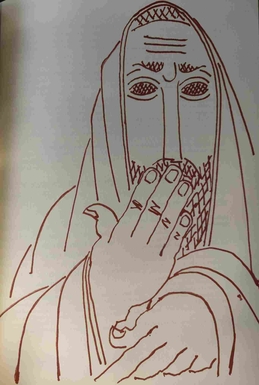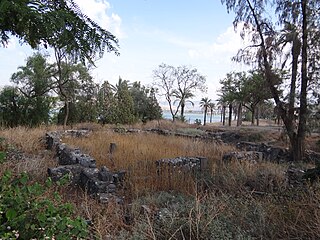Justus of Tiberias (Tiberias, ca. 35 AD - Galilee, ca 100 AD) was a 1st century Jewish author and historiographer. All that we know of his life comes from the Vita which Flavius Josephus apparently wrote in response to the assertions made by Justus in his History of the Jewish War, published around 93/94 or shortly after 100. Josephus is moreover the only writer to mention this document, but without ever citing the slightest extract. This History published by Justus seems to have disappeared shortly after the publication of the Autobiography of Flavius Josephus, because it is unknown to pagan authors and the Christian authors who mention it only quote what Josephus said.
After the Great Jewish Revolt (66-70), Justus was the secretary of King Agrippa II and waited until his death to publish his History of this revolt. He is also known as the author of two other writings which disappeared much later. Thus in the ninth century, Bishop Photios of Constantinople was still able to access a copy of the Chronicle of the Jewish Kings' written by Justus.
Justus of Tiberias is a son of Pistos. [1] Both are presented as authorities of the city of Tiberias when Flavius Josephus was governor of Galilee in 66/67. He is best known as a historiographer. [1] None of his writings have come down to us, but three of them are mentioned by ancient authors. In his De viris illustribus (14), Jerome of Stridon mentions one of them which he calls Commentarioli de scriptura, [1] a commentary on the biblical writings, corresponding to what the Christian tradition calls the Old Testament. A few Church Fathers read his Chronicle of the Jewish Kings, a copy of which Bishop Photios of Constantinople could still consult in the ninth century [2] [3] But the writing that makes us know it, although it seems to have disappeared almost immediately, is his History of the Jewish War, by the reaction it provoked in Flavius Josephus. [4]
In response to the Justus's History, Josephus indeed published his Vita in order to counter various assertions which told a very different story from what the latter had published in his Jewish War twenty years earlier. [5] [6] [7] He attacks Justus at length, even though he had not even mentioned him — nor his father Pistos — in The Jewish War written twenty years earlier. [8] Most of what we know about Justus, moreover, comes from a long digression by Josephus who attacks him in this Vita (336-367). [8] He criticizes him for multiplying the errors [9] — but without citing any explicitly — and for “not having had access, unlike him, to the field notes of Vespasian and Titus". [10]
To discredit his adversary, Josephus indicates that "in the comments of the emperor Vespasian", which Justus was unable to consult, [10] it would be indicated that on the arrival of the future emperor at Ptolemais (spring 67) "the inhabitants of the Decapolis begged him to punish [Justus] as the author of all their evils". [11] What Justus would have escaped only thanks to the clemency of King Agrippa II and at the request of Queen Berenice. [11] According to Josephus, the reason for this questioning was the role that Justus would have played during the attack that the inhabitants of Tiberias carried out against Gadara, at the very beginning of the revolt, in autumn 66, when the Jewish towns began to attack the neighboring Greek cities and vice versa, even before the arrival of Josephus in Galilee. However, this accusation clearly did not succeed and it is obvious that Josephus reports these events in a biased and polemical way. Josephus presents Justus as someone who hesitated between siding with the revolt and who influenced his father Pistos, the only member of the aristocracy of Tiberias not to be a member of the pro-Roman party, led by Julius Capella. While the anti-Roman party was led by Jesus son of Sapphias who led a group of poor people and boatmen. Flavius Josephus accuses him of having led “his country to revolt against the Romans [12] ”. [13]
However, despite Josephus' efforts to blame Justus for the uprising in Galilee, several facts he mentions in his Vita contradict this accusation. [13] Thus, Justus was opposed to the destruction of Herod's palace in Tiberias, [13] whereas on the contrary Josephus tried to obtain its destruction from the Council of the city. [14] Josephus himself says that Justus was not a member of the pro-war faction, but the leader of a faction in intermediate positions. [13] It is also possible that this third party is an invention of Josephus who could not make Justus the leader of the revolutionary party because it was far too well known that its leader was Jesus son of Sapphia. [15] Some of Justus' close relatives were also killed by the revolutionaries in Gamla. [13] Furthermore, Josephus states that he took him prisoner along with all the members of the council of Tiberias, because due to the invincibility of the Romans, this council had secretly pledged allegiance to King Agrippa and demanded that he send forces to take control of the city. [16] [17] Josephus would then have released them, recommending that they show duplicity because if he was well aware of the invincibility of the Romans, they had to pretend to support the war against Rome because of the "brigands" (lestai) [18] [Note 1] Josephus appropriates here “the discriminatory vocabulary of the Romans. [19] On several occasions in The Jewish War, he calls "brigands" the Jewish rebels, [20] such as the Sicarii, the Zealots [21] or the members of the Fourth philosophy. [19] For Shaye J. D. Cohen, those who are called “brigands” in this passage were Josephus' own followers at the material time. [22] Finally, even before Vespasian's offensive in Galilee (spring 67), Justus was no longer in Tiberias, but had joined King Agrippa [23] in Beirut [24] [25] when the latter was going to join his army with Vespasian's three legions to begin the reconquest of all of Palestine, starting with Galilee.
After the Great Jewish Revolt (66-70), he was imperial secretary at the court of Agrippa, [26] [27] king of Batanea and the eastern part of Galilee [1] (Vita 356).
Josephus compares Justus and all the historians who lie “out of hatred or partiality” to “forgers who fabricate false contracts (V § 337)". [28] Then in the long digression in which Josephus attacks Justus (V 356), he suggests that if Agrippa drove Justus away and forbade him to "appear ever before him" from an indefinite moment, it was because he would have realized that he was being dishonest “in the office of secretary with which he [had] honored him." [29] For Shaye J. D. Cohen, “Josephus labels Justus as a forger, an accusation sometimes leveled against official secretaries,” [28] which goes back to the comparison he made in § 337 [28] between those who lie to fabricate a false story – as Justus, according to him, did – and “forgers who fabricate false contracts”. However, Josephus ends this passage by saying that “about all this [he] renounces to prove everything down to the detail". [30]
It was only after Agrippa's death that Justus published his History of the Jewish War, which triggered the writing of the Vita' of Flavius Josephus. [5] [6] [7] The dates of publication of these two writings depend on the date of the death of Agrippa which occurs either in 92/93, [31] [32] [33] or in 100. See on this subject the § Date of the death of Agrippa in the item Agrippa II.
After the publication of the Autobiography of Flavius Josephus, the two men disappear from history.
Justus' book about the great Jewish revolt was an account of the war (Vita 336 and 338) which included the campaign in Galilee, the actions of Josephus [34] and which challenged his version of the siege of Jotapata (Vita 357). He also recounted the siege of Jerusalem [34] (Vita 358).
He also apparently disputed Josephus' version about Philip of Bathyra and what had happened in Gamala and Batanea. It is mainly on these subjects that Josephus endeavors to answer at length, whereas he devotes only one sentence to answering the disputes of Justus about the siege of Iotapata - of which Josephus claims to have directed the defense - and to the about Josephus' version of the events that took place during the siege of Jerusalem [35] (V 357-358).
If Justus had so many reasons to hate Flavius Josephus, why did he wait 20 years (Vita 360) before attacking him in his writing? [36] Josephus uses this expectation as proof of the lies of Justus. [36] If he waited for the death of Vespasian, Titus, Agrippa II, and all those who knew the truth, it was because he knew that they would not have tolerated his lies. [37] [Note 2] We therefore wondered if Justus did not attack Agrippa and the emperors, waiting for their death to publish “his truth”. [26] However, there is no sign that he attacked a royal figure, Jewish or Roman. [26] If that had been the case, it is unlikely that Josephus, who devotes a great deal of space to the attacks on Justus in his Vita, would not have mentioned them. [26]
In his book, Justus declared to tell a superior story to those already published which took care to respect the historical facts. [34] According to Josephus, he thus contradicted the memoirs of Vespasian [10] [34] (Vita 358). He “falsely testified” against Josephus [34] (Vita 338). The Vita of § 357 to 367 also implies that Justus was attacking the veracity of the Jewish War on certain points. [34]
Justus also held that Josephus and his army of Galileans were responsible for anti-Roman actions against his city of Tiberias [38] (Vita 340 and 350). We can deduce from Vita 353 that Justus accused Josephus of brutality at Tiberias. [38] When he arrived in Galilee the first thing that Flavius Josephus recounts in his Vita is the destruction of the palace that King Agrippa possessed in Tiberias, followed by the murder of all the Greek inhabitants of the city. According to him, when he had not entered the city, he asked the authorities of Tiberias to destroy Herod's palace which contained paintings violating the aniconism advocated by certain tendencies of Judaism. [14] While the council of Tiberias, in which the father of Justus sat, was very reluctant to carry out this decision which emanated from Jerusalem, the archon of the city who also led the anti-Roman tendency, Jesus son of Sapphia, would have set fire to the palace and killed all the Greek inhabitants of the city [14] (V 66-67). For Shaye J. D. Cohen, this relationship is probably false. [14] If he played no part in these events and in the subsequent looting of the palace, how could Josephus and the council of Tiberias control the spoils resulting from this looting? [14] Josephus claims that he simply took this booty from the hands of the criminals and gave it to Julius Capella, leader of the tendency of those who wanted "to remain faithful to the Roman people and to their king" [39] in order to preserve the interests of Agrippa [14] (V 68-69). How could he control the loot if it had nothing to do with looting? [14] Cohen speculates that Josephus and Jesus initially cooperated in destroying the palace and in the subsequent massacre. [14]
But in fact it is only totally hypothetical and why did the events in Tiberias during the revolt become a problem thirty years after the events? [40]
One of the major differences between the Jewish War and the Vita is the frequent mention of Justus of Tiberias in the latter text, whereas Flavius Josephus does not say a word about it, in what he had written twenty years earlier. [8] The crucial question is: What was Justus saying in his History that necessitated such a reaction from Josephus?
Most of what we know about him comes from a long digression by Flavius Josephus attacking Justus in his Autobiography (336-367). [8]
If Justus had so many reasons to hate Flavius Josephus, why did he wait 20 years (Vita 360) before attacking him in his writing? [36] Josephus uses this expectation as proof of the lies of Justus. [36] If he waited for the death of Vespasian, Titus, Agrippa, and all those who knew the truth, it was because he knew that they would not have tolerated his lies [37] [Note 2] (359-360). We therefore wondered if Justus did not attack Agrippa and the emperors, waiting for their death to publish “his truth”. [26] However, there is no sign that he attacked a royal figure, Jewish or Roman. [26] If that had been the case, it is unlikely that Josephus, who devotes a great deal of space to the attacks on Justus in his Vita, would not have mentioned them. [26]
In his Vita, Josephus confirms that his “narrative of the war is made from the Roman point of view” [41] and that “what Rome represents for Josephus, beyond the real or supposed favors with which he was showered, is the State, the State of divine right. [41] He also writes: “The Emperor Titus wanted the knowledge of these events to be spread to the public only from my books alone, so much so that he initialed them with his own hand and ordered their publication". [42]
If this attitude of Titus became an imperial policy continued after his death, it perhaps explains the rapid disappearance of Justus of Tiberias' book on the History of Jewish Warfare.
Justus's works have been lost and they currently survive only in small fragments from other works: [43] Justus is the author of a War of the Jews, probably written in Greek, [44] which he only publishes after the death of Agrippa (92 ou 100) whom he presents in an unfavorable light. This work is mentioned by Eusebius [45] of Caesarea and Jerome. [46] of Stridon, but indirectly, Flavius having probably worked for the disappearance of the work of his rival.
He is also the author of a Chronicle of the Jewish Kings from Moses to Agrippa II , briefly summarized by Photius. [47] Photius of Constantinople describes it as being written in sketchy forms. It is likely that several later authors used this material in their own works, such as Sextus Julius Africanus, Eusebius, Diogenes Laërtius; [48] and the Byzantine historian George Syncellus. Commenting this Chronicle, Photios laments that Justus failed to make any mention of Jesus of Nazareth. [49] [50]
According to Jerome, Justus also wrote a Brief commentary of the Holy Scriptures, but no other references of that work survives and it is unclear whether it was an authentic work or a pseudoepigrapha.
{{cite book}}: |work= ignored (help); Unknown parameter |agency= ignored (help)CS1 maint: location missing publisher (link).{{cite book}}: Unknown parameter |agency= ignored (help).{{cite book}}: Unknown parameter |agency= ignored (help).{{cite book}}: Unknown parameter |agency= ignored (help)CS1 maint: location missing publisher (link).{{cite book}}: Unknown parameter |agency= ignored (help).{{cite book}}: |work= ignored (help); Unknown parameter |agency= ignored (help)CS1 maint: location missing publisher (link).{{cite book}}: Unknown parameter |agency= ignored (help)CS1 maint: location missing publisher (link).{{cite book}}: Unknown parameter |agency= ignored (help)CS1 maint: location missing publisher (link).{{cite book}}: Unknown parameter |agency= ignored (help).{{cite book}}: Unknown parameter |agency= ignored (help).{{cite book}}: Unknown parameter |agency= ignored (help)CS1 maint: location missing publisher (link).{{cite book}}: Unknown parameter |agency= ignored (help)CS1 maint: location missing publisher (link).{{cite book}}: Unknown parameter |agency= ignored (help)CS1 maint: location missing publisher (link).{{cite book}}: Unknown parameter |agency= ignored (help)CS1 maint: location missing publisher (link).{{cite book}}: Unknown parameter |agency= ignored (help)CS1 maint: location missing publisher (link).{{cite book}}: Unknown parameter |agency= ignored (help)CS1 maint: location missing publisher (link).{{cite book}}: |work= ignored (help); Unknown parameter |agency= ignored (help)CS1 maint: location missing publisher (link).{{cite journal}}: Unknown parameter |agency= ignored (help).
Flavius Josephus was a Roman–Jewish historian and military leader. Best known for writing The Jewish War, he was born in Jerusalem—then part of the Roman province of Judea—to a father of priestly descent and a mother who claimed royal ancestry.

Titus Caesar Vespasianus was Roman emperor from 79 to 81. A member of the Flavian dynasty, Titus succeeded his father Vespasian upon his death, becoming the first Roman emperor to succeed his biological father.

Herod Agrippa, also known as Herod II or Agrippa I, was the last Jewish king of Judea. He was a grandson of Herod the Great and the father of Herod Agrippa II, the last known king from the Herodian dynasty. He was acquaintance or friend of Roman emperors and even played crucial roles in internal Roman politics.

Herod Agrippa II, officially named Marcus Julius Agrippa and sometimes shortened to Agrippa, was the last ruler from the Herodian dynasty, reigning over territories outside of Judea as a Roman client. Agrippa II fled Jerusalem in 66, fearing the Jewish uprising and supported the Roman side in the First Jewish–Roman War.

Berenice of Cilicia, also known as Julia Berenice and sometimes spelled Bernice, was a Jewish client queen of the Roman Empire during the second half of the 1st century. Berenice was a member of the Herodian Dynasty that ruled the Roman province of Judaea between 39 BC and 92 AD. She was the daughter of King Herod Agrippa I and Cypros and a sister of King Herod Agrippa II.

Herod Antipas was a 1st-century ruler of Galilee and Perea. He bore the title of tetrarch and is referred to as both "Herod the Tetrarch" and "King Herod" in the New Testament He was a son of Herod the Great and a grandson of Antipater the Idumaean. He is widely known today for accounts in the New Testament of his role in events that led to the executions of John the Baptist and Jesus of Nazareth. His father, Herod the Great, was described in the account as ordering the Massacre of the Innocents, marking the earliest Biblical account of the concerns of the government in Jerusalem regarding Jesus's existence.

The First Jewish–Roman War, sometimes called the Great Jewish Revolt, or The Jewish War, was the first of three major rebellions by the Jews against the Roman Empire fought in Roman-controlled Judea, resulting in the destruction of Jewish towns, the displacement of its people and the appropriation of land for Roman military use, as well as the destruction of the Jewish Temple and polity.

Gamla, alt. sp. Gamala was an ancient Jewish town on the Golan Heights. Believed to have been founded as a Seleucid fort during the Syrian Wars, it transitioned into a predominantly Jewish settlement that came under Hasmonean rule in 81 BCE. The town's name reflects its location on a high, elongated ridge with steep slopes resembling a camel's hump.

The siege of Jerusalem of 70 CE was the decisive event of the First Jewish–Roman War, in which the Roman army led by future emperor Titus besieged Jerusalem, the center of Jewish rebel resistance in the Roman province of Judaea. Following a five-month siege, the Romans destroyed the city and the Second Jewish Temple.
The Life of (Flavius) Josephus, also called the "Life of Flavius Josephus", or simply Vita, is an autobiographical text written by Josephus in approximately 94-99 CE – possibly as an appendix to his Antiquities of the Jews – where the author for the most part re-visits the events of the War, apparently in response to allegations made against him by Justus of Tiberias.

Perea or Peraea was the term used mainly during the early Roman period for part of ancient Transjordan. It lay broadly east of Judea and Samaria, which were situated on the western side of the Jordan River, and southwest of the Decapolis.

Mount Arbel is a mountain in The Lower Galilee near Tiberias in Israel, with high cliffs, views of Mount Hermon and the Golan Heights, a cave-fortress, and ruins of an ancient synagogue. Mount Arbel sits across from Mount Nitai; their cliffs were created as a result of the geological processes leading to the creation of the Jordan Rift Valley.
John of Gischala was a leader of the first Jewish revolt against the Romans.

Simeon ben Gamliel (I) (Hebrew: שמעון בן גמליאל or רשב"ג הראשון; c. 10 BC – 70 AD) was a Tanna sage and leader of the Jewish people. He served as nasi of the Great Sanhedrin at Jerusalem during the outbreak of the First Jewish–Roman War, succeeding his father in the same office after his father's death in 50 AD and just before the destruction of the Second Temple.

Al-Sinnabra or Sinn en-Nabra, is the Arabic place name for a historic site on the southern shore of the Sea of Galilee in modern-day Israel. The ancient site lay on a spur from the hills that close the southern end of the Sea of Galilee, next to which towards its south being the tell, Khirbet Kerak or Bet Yerah, one of the largest in the Levant, spanning an area of over 50 acres. Bet Yerah was the Hellenistic era twin city of Sennabris, as al-Sinnabra was known in Classical antiquity, and its remains are located at the same tell.

The siege of Yodfat was a 47-day siege by Roman forces of the Jewish town of Yodfat which took place in 67 CE, during the Great Revolt. Led by Roman General Vespasian and his son Titus, both future emperors, the siege ended with the sacking of the town, the deaths of most of its inhabitants and the enslavement of the rest. It was the second bloodiest battle of the revolt, surpassed only by the Siege of Jerusalem, and the longest except for Jerusalem and Masada. The siege was chronicled by Josephus, who had personally commanded the Jewish forces at Yodfat and was subsequently captured by the Romans.
The Galilee campaign, also known as the Northern Revolt, took place in the year 67, when Roman general Vespasian invaded Galilee under the orders of Emperor Nero in order to crush the Great Revolt of Judea. Many Galilean towns gave up without a fight, although others had to be taken by force. By the year 68, Jewish resistance in the north had been crushed, and Vespasian made Caesarea Maritima his headquarters and methodically proceeded to cleanse the coastline of the country, avoiding direct confrontation with the rebels at Jerusalem.
Tarichaea is the Greek place name for a historic site of disputed location. It was situated along the shore of the Sea of Galilee, and mentioned in the writings of Josephus. Tarichaea was one of the first villages in Galilee to have sustained an attack by Rome, during the First Jewish-Roman War. The village (κώμη) attracted to it the seditious from the outlying regions east of Galilee, who mixed with the local townsfolk and who relied upon some 230 boats on the Sea of Galilee for protection in the event of an assault upon the village. When the village was eventually overrun by the Roman army, the population surrendered.
Bethmaus, or Beth Maʿon, also called Maon, was a Jewish village during the late Second Temple and Mishnaic periods, and which was already a ruin when Kitchener visited the site in 1877. It was situated upon the hill, directly north-west of the old city of Tiberias, at a distance of one biblical mile, rising to an elevation of 250 metres (820 ft) above sea-level. It is now incorporated within the modern city bounds of Upper Tiberias. The remaining structure built over the site is a Sheikh's Tomb.

Cypros (1st-century) was a queen consort of Judea. She was married to king Herod Agrippa.